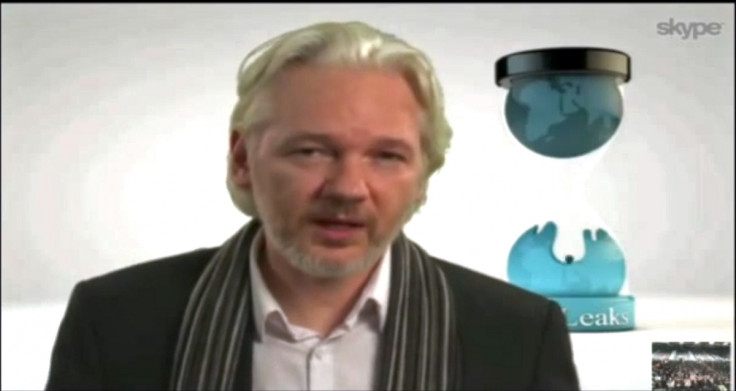Julian Assange to SXSW: Expect New Leaks and Stop NSA's Domination of Internet

WikiLeaks founder Julian Assange spoke via Skype to the audience at the SXSW 2014 conference in Austin, Texas to warn them that something had to be done to stop the NSA and international governments from their "military occupation of our civilian space".
Watch our live blog of the Edward Snowden SXSW 2014 interview from 4pm GMT today
Assange, the founder of the whistleblower website, has been living in the Ecuadorian embassy in London since June 2012 after claiming diplomatic asylum to avoid being extradited to Sweden to face allegations of rape and sexual assault by two WikiLeaks volunteers.
In a live-streamed interview session with Benjamin Palmer from marketing agency the Barbarian Group, the WikiLeaks founder said that he founded the whistleblowing website to expose injustice and reveal what governments are up to, in order to "achieve justice".
"It became clear to me that one of the best ways to achieve justice is to expose injustice. And you can be simplistic about it, which some people are. It's not that when you expose something automatically there is justice," Assange told the audience.
"There's always a really decent chance that they're not going to get away with it, and the people affected can take some kind of action. And there's no confidence in the power being deployed. No confidence in the injustice."
According to Assange, the NSA and various surveillance agencies around the world had been trying to prevent encryption technology from being used by people outside the government over the last 20 years, making the point that governments might have been trying to stop civilians from having secrets they could not spy on.
Totalitarian Dystopia
Assange raised concerns about how 75% of all global military spend was now in the hands of Nato, and how the transfer of power from users on the internet was steadily going in a similar direction as that of physical power – straight into the hands of government surveillance energies such as the NSA.
"The NSA has grown to be a rogue agency. It has grown unfettered and [the NSA and GCHQ have been sucking up all] our interactions. The ability to surveil everyone on the planet is almost there, and arguably we will be there within a few years. To store it all [has] led to a huge transfer of power from the people who are surveilled upon, to those who control the surveillance complex," he said.
"Historically, the NSA has run a PR campaign based on not existing. When the revelations came out somehow this was an important element of power that had been developed unnoticed by people."
Assange likened the internet to being the "greatest tool of human emancipation that had ever been" but said it was in danger of becoming a "totalitarian dystopia" since no one can opt out of having their communications monitored.
Military occupation of our civilian space
He also said that the transition of the internet to becoming a political space where people can take action and everyone can see that action taking place is an important movement, which will be threatened in the future unless we stand up and do something about it.
"Now that the internet has merged with human society the laws that apply to the internet apply to human society. This penetration of the internet by the NSA and GCHQ is the penetration of our human society. It means there has been a militarisation of our civilian space – a military occupation of our civilian space is a very serious matter," he stressed.
"We are now all part of what we would traditionally call the state, whether we like it or not, so we have no choice but to attempt to manage the behaviour of the state that we have been forced to be part of, and that includes managing what laws and activities are acceptable."
When pushed by Palmer about what was next for WikiLeaks, Assange indicated that he still had information to leak but said he did not want to say too much in case the media warned the surveillance agencies ahead of time.
"Yes, there's important upcoming material. It's actually quite interesting when you deal with an organisation like the Washington Post – even some of the best reporters there, when [they] publish something on the CIA, goes to them beforehand to keep the relationship going, but I don't think it's right to give the alleged perpetrator the heads up."
© Copyright IBTimes 2025. All rights reserved.






















